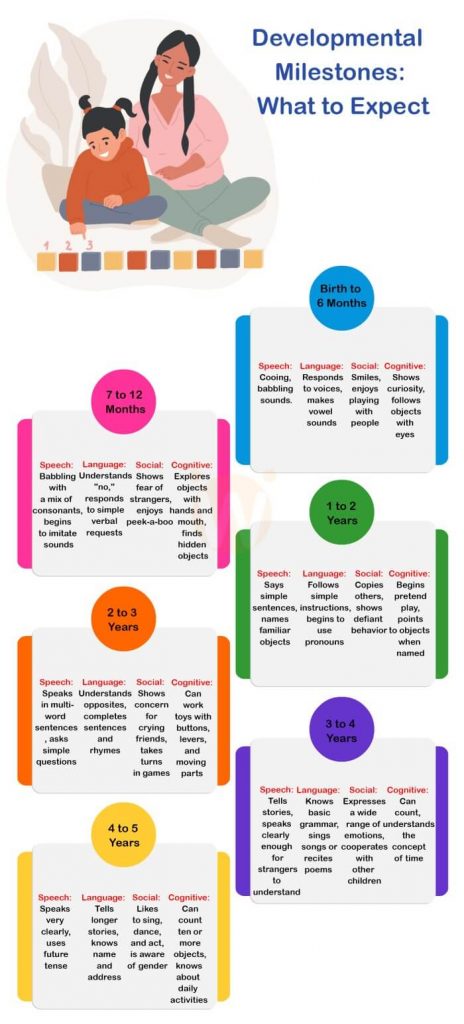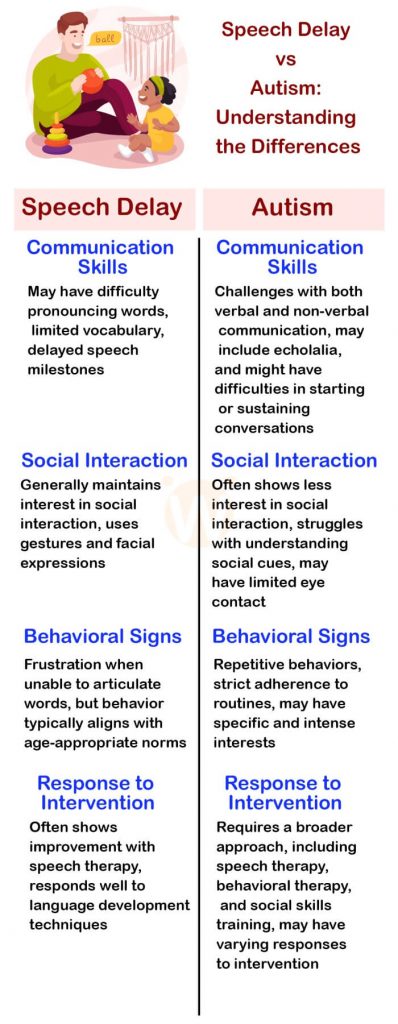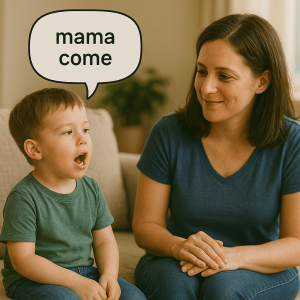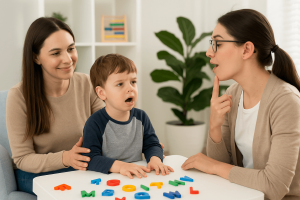Is It Speech Delay or Autism? Understanding Your Child’s Communication Development
By Prapoorna M
Last Updated: January 4, 2024
As parents, watching your child grow and develop is an experience filled with wonder and anticipation. A significant part of this developmental journey is how your child learns to communicate. However, when there are delays or differences in speech and language development, it’s natural to have concerns. One question that often arises for many parents is whether their child is experiencing a typical speech delay or something more, like Autism Spectrum Disorder (ASD).
In this article, we’ll delve into the nuances of speech delays and autism, addressing common concerns and providing clarity on these distinct conditions. Our goal is to empower parents with knowledge, helping them understand when to seek guidance and how to best support their child’s communication development.
Book a free Online Speech Consultation.
Understanding Typical Speech and Language Development

Every child is unique, and their journey through speech and language development is no exception. Typically, children begin cooing and babbling in their first few months, progressing to simple words like “mama” and “dada” around their first birthday. By the age of two, many children start combining words into simple phrases. However, it’s essential to recognize that these milestones can vary greatly. Some children may be early talkers, while others take a bit more time to find their voice.
Understanding these developmental milestones is crucial because it provides a baseline to identify when a child may be experiencing a speech delay. But remember, variations in development are common, and a slower pace doesn’t automatically signal a serious issue. What’s important is monitoring progress and seeking professional advice if there are concerns about your child’s speech and language development.
In the following sections, we’ll explore the characteristics of speech delays and autism, helping you distinguish between the two and understand when and how to seek help. Stay tuned as we also share insights on the supportive resources available through Wellness Hub, dedicated to nurturing your child’s communication journey.
For a more comprehensive look at speech and language developmental milestones, see our detailed guide here.
What is Speech Delay?
Speech delay in children is a common concern, characterized by a slower development in the ability to form speech sounds properly at the expected age. It’s important to distinguish this from a language delay, which refers to difficulties in understanding or using words in communication, not just the act of speaking.
Common causes of speech delay can vary. They include hearing impairments, where the child’s ability to hear and process sound is affected, leading to difficulties in learning to speak. Cognitive delays, where a child’s intellectual development is slower than typical, can also impact speech development. Additionally, environmental factors, such as limited exposure to language or speech, can play a role.
The signs of speech delay are often noticeable. A child might not use words or simple phrases as expected for their age, or they might have difficulty pronouncing sounds. This differs from language issues, where the child may struggle to put words together to form meaningful sentences or understand what is said to them.
To understand more about speech delay in children, including causes and interventions, visit this detailed guide on speech delay in children.
What is Autism Spectrum Disorder (ASD)?
Autism Spectrum Disorder (ASD) is a complex developmental disorder that primarily affects social interaction and communication. It encompasses a range of conditions characterized by challenges with social skills, repetitive behaviors, and speech and nonverbal communication.
Early signs of autism often include limited eye contact, a lack of responsive gestures or facial expressions, and a delay in or absence of spoken language. Children with ASD might also show a reduced interest in sharing enjoyment, interests, or achievements with others.
Autism can significantly impact speech and language development. Some children with ASD may remain nonverbal, while others might develop language but struggle with the natural flow of conversation. They may also exhibit echolalia, the repetition of words or phrases, and have a hard time understanding abstract language.
Understanding the nuances of speech delay and autism can be crucial in seeking the right support and intervention. At Wellness Hub, we’re committed to providing resources and guidance to help navigate these challenges. Our expert team offers insights and support tailored to each child’s unique needs, ensuring families have the tools to support their child’s developmental journey.
For additional insights into Autism Spectrum Disorder, including symptoms and treatments, check out our detailed article on Autism Spectrum Disorder.
Comparing Speech Delay and Autism
Understanding the differences between speech delay and Autism Spectrum Disorder (ASD) is crucial for parents navigating their child’s developmental journey. While both can affect a child’s ability to communicate, they are distinct in several ways.

Children with speech delay, for example, might struggle with the clarity or fluency of their speech. However, they typically maintain a desire to interact socially and can often use gestures or other non-verbal methods to communicate. For instance, a child with speech delay might point, gesture, or use facial expressions to compensate for their difficulty with words.
In contrast, children with ASD often face broader challenges in social communication. They might not only struggle with speech but also show less interest in social interactions. These children might avoid eye contact, not respond to their name, or seem indifferent to engaging with others. A child with ASD might not use gestures like pointing or waving, and they may not mimic others’ actions or expressions.
While a child with speech delay might show frustration when not understood, a child with ASD might instead withdraw or engage in repetitive behaviors when faced with communication challenges.
For further information on speech and language development and how to support your child, visit our comprehensive guide on Speech Therapy here.
Why do parents confuse autism and language delay?
One of the key reasons parents might confuse autism with a speech delay lies in the overlap of their symptoms. Often, language delay is one of the early signs of autism, and many children on the autism spectrum experience some degree of language delay. If a language delay remains unaddressed over time, it can lead to significant frustration for the child, manifesting in behaviors like temper tantrums. These expressions of frustration can closely resemble the behaviors sometimes exhibited by children with autism, making it challenging for parents to discern the underlying issue.
It’s crucial to understand that while there is an intersection, a speech delay in itself does not necessarily indicate autism. Each condition has its unique characteristics and requires a distinct approach to support and intervention. Therefore, if there’s any concern regarding whether a child’s challenges are due to a speech delay or autism, it’s advisable to consult with a speech-language pathologist or psychologist. These professionals can provide a comprehensive evaluation, helping to clarify the child’s needs and guide the most effective course of action.
This nuanced understanding is vital for parents. It helps in taking informed steps towards seeking appropriate guidance and ensuring that their child receives the support tailored to their specific developmental journey.
In addition to this, if any parent thinks an Autism evaluation is needed, it is better to get it
done by a speech language pathologist or psychologist.
When to Seek Professional Help
Recognizing when to seek professional help is a vital step in supporting your child’s developmental needs. If you have concerns about your child’s speech or social interactions, it’s advisable to consult a professional.
Signs of Speech Delay and Autism in Children
| Age Group | Signs of Speech Delay | Signs of Autism |
|---|---|---|
| 6-12 Months | – Limited or no babbling. – Doesn’t respond to speech. – Reduced variety of sounds. – Lack of social babbling. | – Limited eye contact. – Doesn’t respond to name. – Little interest in social interactions. – Doesn’t smile socially. |
| 12-18 Months | – Few or no words. – Doesn’t follow simple commands. – Doesn’t use gestures, like pointing. – Prefers solitude. | – Lack of pointing or gesturing to show interest. – Doesn’t imitate actions. – Absence of single words by 16 months. – Unusual focus on objects. |
| 18-24 Months | – Can’t combine words. – Limited vocabulary. – Repeats the same words. – Struggles to imitate speech. | – Limited interest in others. – Repetitive behaviors or movements. – Delay in two-word phrases. – Minimal response to verbal cues. |
| 2-3 Years | – Difficulty forming sentences. – Hard to understand. – Struggles with following directions. – Frustration during communication attempts. | – Challenges in pretend play. – Delays in speech development. – Difficulty with social cues. – Repetitive speech or phrases (echolalia). |
Pediatricians are often the first point of contact. They can provide initial assessments and referrals to specialists. If speech delay is suspected, a speech therapist can evaluate your child’s speech and language skills and suggest appropriate interventions. Speech therapists play a critical role in diagnosing and treating speech and language disorders, tailoring therapy to each child’s unique needs.
For concerns about ASD, a child psychologist or a developmental pediatrician can conduct a more comprehensive evaluation. They assess not only speech and language but also social interaction, behavior, and overall development.
At Wellness Hub, we understand the importance of early intervention. Our team of professionals, including pediatricians, speech therapists, and child psychologists, is dedicated to providing comprehensive support for children with speech delays or ASD. For more information on when to seek help and the services we offer, please visit our Child Speech Development Services page.
Early Intervention and Its Importance
Early intervention refers to the timely provision of specialized support and services for children with developmental delays or specific health conditions, such as speech delay or autism. This approach is crucial because the first few years of a child’s life are a critical period for brain development. Early intervention can significantly improve outcomes for children by leveraging their natural learning abilities when they are most receptive.

For speech delays, intervention might include speech therapy, where children are given the tools and strategies to improve their pronunciation, increase their vocabulary, and enhance their overall communication skills. In the case of autism, early intervention encompasses a broader range of strategies, including behavioral therapies, communication therapy, and social skills training, designed to address the specific challenges associated with ASD.
At Wellness Hub, we are committed to supporting early intervention and child development. Our team of experts works closely with families to provide personalized care plans that cater to the unique needs of each child. By offering resources and professional guidance, Wellness Hub plays a pivotal role in nurturing the developmental journey of children with speech delays and autism.
Explore home-based occupational therapy activities that can complement early intervention strategies.
How Parents Can Support Their Child’s Development
Parents play a vital role in supporting their child’s speech and language development. Here are some practical tips to encourage this at home:
- Engage in regular, meaningful conversations with your child, even if they are not yet speaking. Narrate your activities and respond to their gestures or sounds.
- Read to your child daily, pointing out and discussing pictures, and encouraging them to turn pages.
- Play interactive games that involve singing, rhyming, and repetition to enhance listening and speaking skills.
- Create a supportive environment that encourages your child to express themselves. Celebrate their attempts to communicate, whether successful or not.
- Limit screen time and promote activities that require interaction and communication.
Creating a nurturing and responsive environment at home is essential. It fosters not only language development but also emotional and social growth.
For tailored advice on supporting your child’s development, consider our online counselling services for child parenting.
Conclusion
In conclusion, understanding the differences between speech delay and autism, recognizing the signs, and knowing when to seek professional help are crucial steps in supporting your child’s development. Early intervention is key to maximizing the potential of children facing these challenges. By taking proactive steps and working with professionals, parents can significantly influence their child’s developmental trajectory.
At Wellness Hub, we are dedicated to providing comprehensive support to families navigating these challenges. Our expert team, tailored interventions, and commitment to early childhood development align seamlessly with the needs of parents seeking guidance. For more information on how we can assist you and your child, visit our services page.
Remember, every child’s journey is unique, and with the right support, every child can reach their full potential.
Frequently Asked Questions:
1. What are the main differences between speech delay and autism?
Speech delay primarily affects a child’s ability to speak and articulate words correctly, while autism is a broader developmental disorder that impacts communication, social interaction, and behavior. Children with speech delay may still engage socially and use non-verbal communication effectively, unlike children with autism who often struggle with social cues and repetitive behaviors.
2. At what age should I be concerned about my child’s speech development?
Concerns typically arise if a child is not babbling by 12 months, not saying single words by 16 months, or not using two-word phrases by 24 months. However, every child develops at their own pace, so variations can be normal.
3. How can early intervention benefit my child?
Early intervention can significantly improve communication skills, social abilities, and learning outcomes. It utilizes a child’s natural learning ability during their critical developmental years, maximizing their potential for improvement.
4. What role can parents play in supporting their child’s speech and language development?
Parents can engage in regular conversations with their child, read to them, play interactive and educational games, limit screen time, and create a supportive and responsive environment at home.
5. When should I seek professional help for my child’s speech or language concerns?
It’s advisable to consult a professional if your child shows signs of speech delay (like not meeting verbal milestones) or if you notice behaviors typically associated with autism (such as limited social interaction or repetitive behaviors).
6. What types of professionals can help diagnose and treat speech delay or autism?
Pediatricians, speech-language pathologists, and child psychologists are key professionals in diagnosing and treating speech delay and autism. They can provide comprehensive assessments and tailored intervention strategies.
7. Can children with speech delay or autism lead a normal life?
Absolutely. With appropriate intervention and support, many children with speech delays or autism can develop effective communication skills and lead fulfilling lives. The key is early detection and intervention.
8. Does speech delay always indicate autism?
No, not all speech delays are indicative of autism. Many children with speech delays do not have autism, and their challenges are primarily with speech production and fluency.
9. How does Wellness Hub support children with speech delay or autism?
Wellness Hub offers a range of services including assessments, speech therapy, and individualized intervention plans, provided by a team of experienced professionals in child development.
10. Are there any specific activities recommended for children with speech delay?
Interactive activities such as singing, storytelling, and role-playing can be beneficial. Activities that encourage turn-taking and imitation, like simple board games and mimicry games, are also helpful.
About the Author:
Prapoorna Mangalampalli, Psychologist
Prapoorna, an author with dual master’s degrees in Psychology and English, excels in exploring and enhancing human experiences. Her writing, characterized by deep empathy and insight, primarily focuses on the complexities of counseling, spanning areas such as online, marital, relationship, child, family, and career counseling. Specialized training in various counseling sectors underscores her dedication to positive change. In her blogs, Prapoorna offers valuable guidance and a unique perspective for parents of children with Autism and special needs, creating a supportive community in this realm.
Book your Free Consultation Today
Parent/Caregiver Info:
Client’s Details:
* Error Message








